Tessa Thompson in Black and White

There’s something about Tessa Thompson—an alchemy that, at the mere mention of her name, makes people start to swoon.
And rightfully so. For all the heart eyes that surround her name, the woman IRL is proof that all the excitement is well worth it.
While the rest of us have been trying to figure out how many books to prop our laptops on or buying ring lights for our monitors, Thompson effortlessly glows over Zoom. She looks the height of chic in a black top and an enviable slicked-back bun that would make an Eco Style Gel enthusiast weep. She’s lounged with the ease and warmth that we hope to get from an "aspirationally approachable” movie star. All of that combined makes the job of chatting about her latest film, Passing, that much easier.
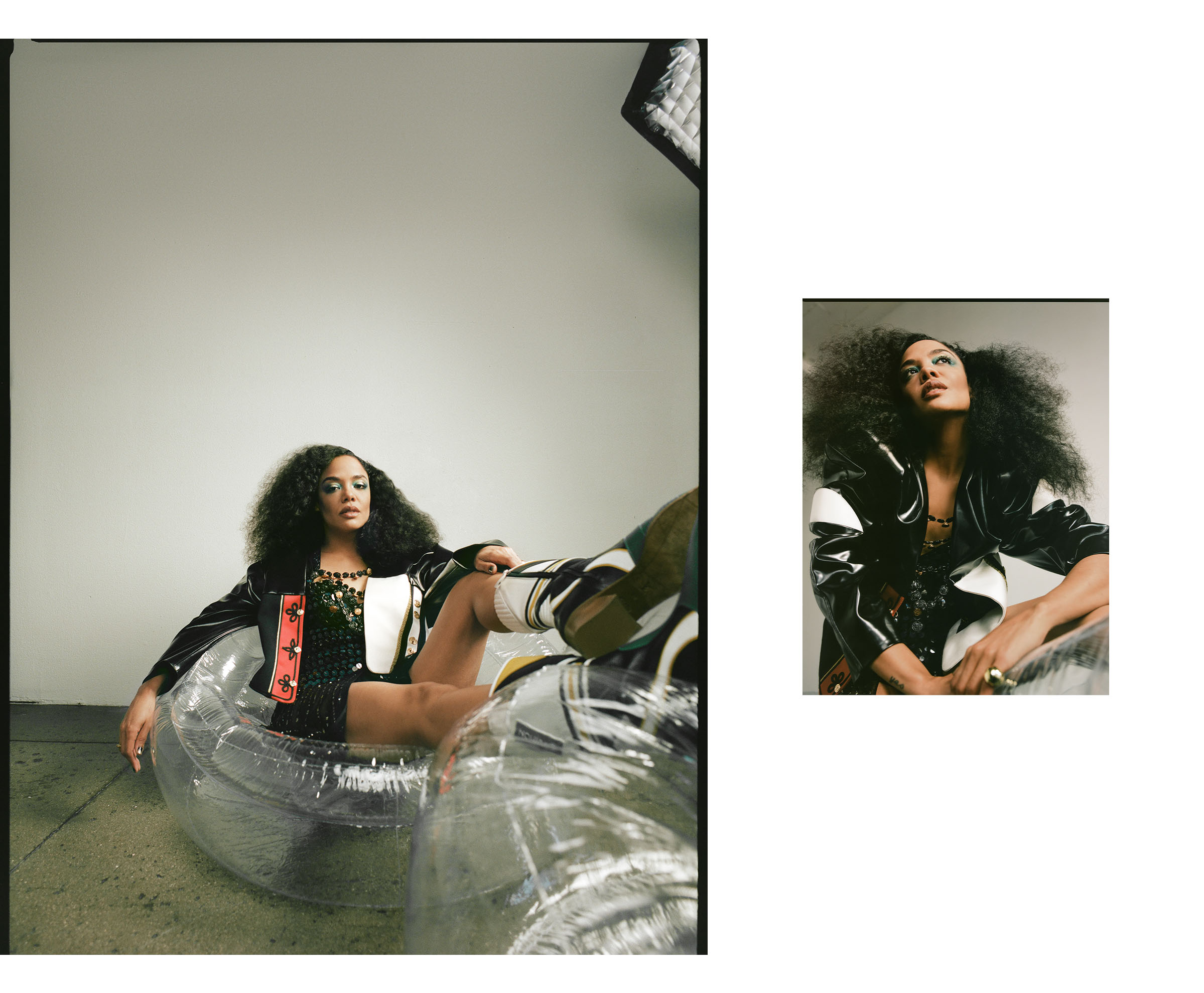
Adapted from the 1929 novel by Nella Larsen, Passing tells the story of two Black women, Irene Redfield ( Thompson) and Clare Kendry (Academy Award nominee Ruth Negga), who can "pass” as white but choose to live on opposite sides of the color line during the height of the Harlem Renaissance in late 1920s New York. After a chance encounter reunites the former childhood friends one summer afternoon, Irene reluctantly allows Clare into her home, where she ingratiates herself to Irene’s husband Brian (André Holland), her family, and her larger social circle. As their lives become more deeply intertwined, Irene finds her once-steady existence upended by Clare. The film marks the directorial debut of Rebecca Hall, who also adapted the screenplay and was a darling of the 2021 Sundance Film Festival.
Somehow, a novella from ’29 depicting the Harlem Renaissance and debuting in 2021 as a black-and-white film manages to hit the bull’s-eye on intersectionality, Black womanhood, class dynamics, and sexuality. And that confluence was what led Thompson to the adaptation of Larsen’s work.
"When you think of the course of progress in this country, unfortunately, 100 years ago is really not that long ago—particularly, I think, for Black bodies and the things that concern us. Those sort of political vantage points aside, I just had never read something like this that felt like part psychological thriller because of what my character is struggling with… which is what compelled me to do the film,” Thompson says. "I hadn’t seen that dynamic before—a look into women that felt so fraught with so many things like lust, longing, jealousy, confusion, warmness—and it talked about the way that we pass for all sorts of things. For happy inside of marriages, for satisfied motherhood, the way we pass for not being dissatisfied in general with our lives and where we find ourselves. And so those things, I thought, just felt so modern and that they could be anytime, any place.”
Larsen’s work was a meditation on the shaky dynamic between social obligation and personal freedom. The notion of passing for white has long been a ubiquitous part of the Black experience for many Black folks. The film Passing removes the practice from the center of the story and instead tells a larger tale. "For me, the thing that really interests me, which is not to say that I’m not interested in making things strictly about race, but I think that’s a way of limiting our experience. … Even as a Black woman, the things that touched me, that move me, are all of the interpersonal things as well, which cannot be separated, obviously, from the way that I move through space,” Thompson says.
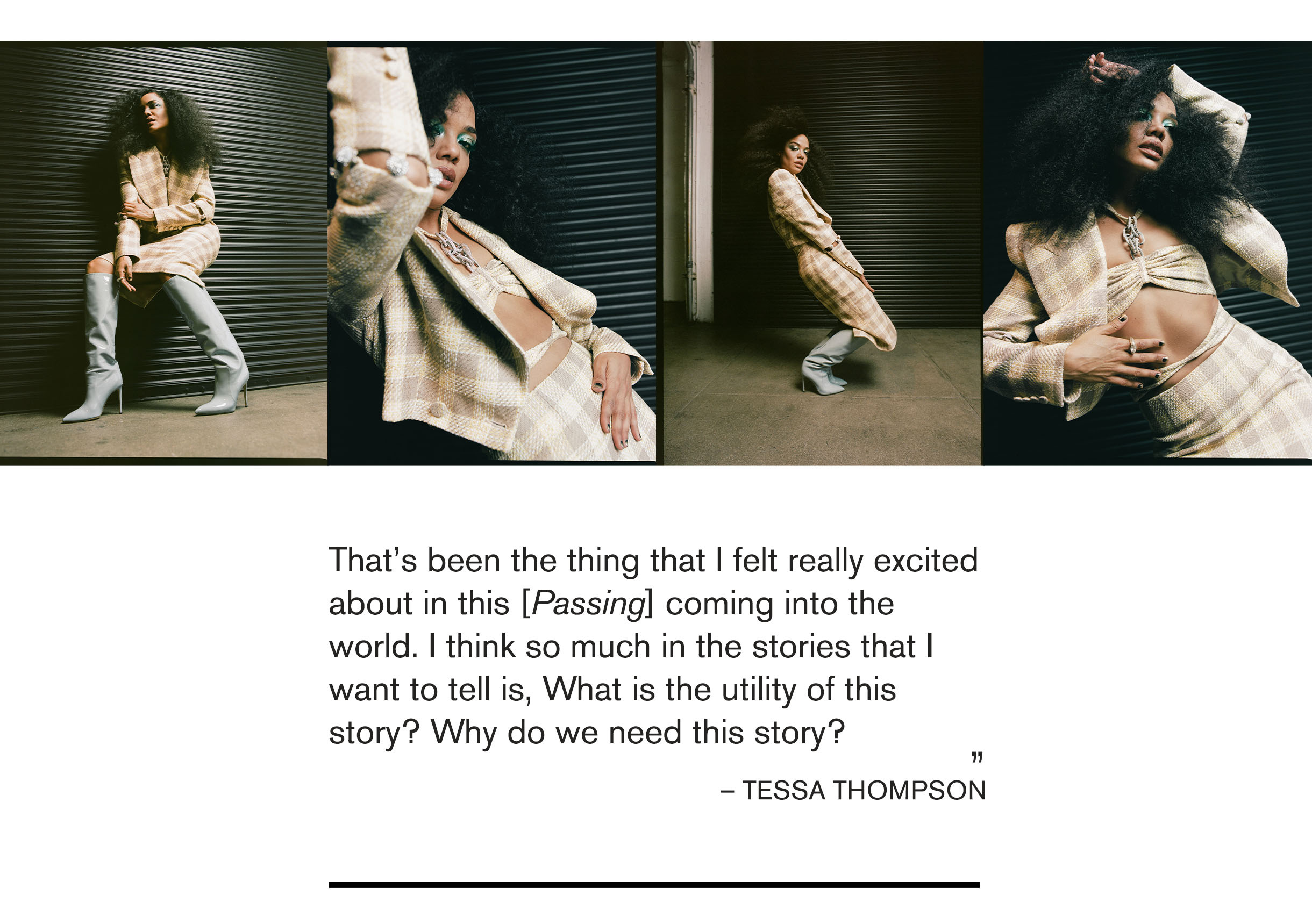
The film takes an almost modern approach, causing the audience, at first glance, to question whether the characters could "pass” by any sense of the definition.
"They look at Ruth and I and thought, ‘Well, those are two Black women, like passing for what?’ And I think that was really intentional for Rebecca. She wanted the audience to come in always knowing and assuming that you’re seeing two Black women, particularly for Ruth, that you’re never suspending your disbelief,” Thompson ruminates.
While colorism is a familiar burden through BIPOC communities, outside of Black circles, "passing” in a new concept. Thompson even laughs while remembering that some people thought "passing” meant the actress had passed away when the posters for the film first came out.
The curtain was pulled back on the "one-drop rule,” a pseudoscientific social construct and legal instrument that asserted that any person with even one ancestor of Black ancestry was considered Black, even 1/32 or some other infinitesimal amount, and therefore subjected to the rules of segregation. When Homer Plessy stepped on that train in 1892, refusing to sit in the car designated for Black people, the idea of measuring Blackness was born. "Separate but equal” was introduced and not challenged until Brown v. Board of Education. TikTok influencers introduced many to "white passing” minorities, or the idea of Blackfishing. As Imani Perry states in Harper’s Bazaar, the rules of racial membership have shifted, and Gen Z is skeptical of the one-drop rule of the past. After the movie premiered on Netflix, Black Twitter exploded with stories of "passing,” with Black folks explaining how the idea impacted their families and the generational repercussions of those choices.
"And that’s the thing. The film came from that place. It came from Rebecca [Hall] wrestling with this legacy of passing in her family [and] trying to understand it. And so I’m really curious to hear those stories from people. That’s been the thing that I felt really excited about in this coming into the world. I think so much in the stories that I want to tell is, What is the utility of this story? Why do we need this story? Do we need this story?” Thompson explains.
Now more than ever, we do need these stories, these stories like Larsen’s that enter canon alongside Imitation of Life (a 1959 film that tells the story of an acclaimed Broadway star, who the audience learns is a white-passing Black woman, who shuns her Black mother to her deathbed) and Brit Bennett’s The Vanishing Half (a novel about twins, where one lives a life as a light-skinned Black woman and the other passes for white, and the repercussions that creates for the generations that follow them). As author Koa Beck says, "Passing can be a window into how progressive we are not.”
In a way, the film is a Rorschach test for the viewer. Do they see two Black women attempting to pass or two women dealing with their sexuality or two spouses testing the limits of their love?
"I really love and feel excited by making a piece of work that, for some people, they will think it’s a film where nothing happens,” Thompson says. "And I think, in that way, the film says more about people’s reaction to the film than it does about the film necessarily, and that I find really exciting. I’m really thrilled to be a part of a piece of work that engages people on all those levels.”
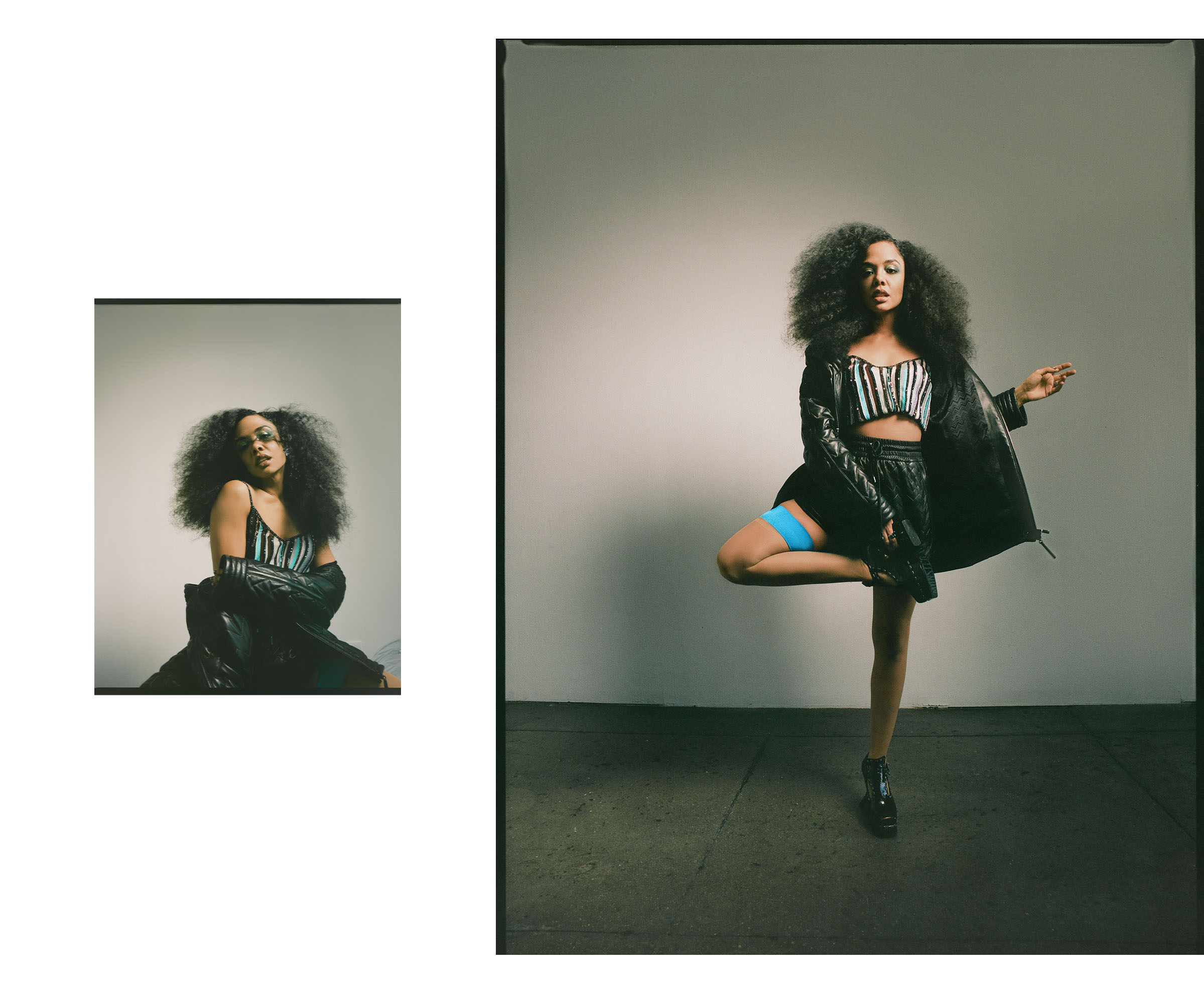
Larsen’s adaptation isn’t the only bookish endeavour Thompson is pursuing. It was recently announced that her production company, Viva Maude, would be adapting The Secret Lives of Church Ladies by Deesha Philyaw and Luster by Raven Leilani. Thompson is using her star power to exalt Black female authors, a move that has been in the making since she cracked open a book by Octavia Butler, one of her favorite sci-fi writers.
"There was no clear pathway for me thinking about these incredible, powerful Black authors and being able to shepherd their work into the world in terms of a visual landscape, but I certainly had the idea. And now, that’s something that Passing really reinvigorated in me. I knew I was gonna start this company before I made that film, and then, the world shut down for a while, and it gave me the real opportunity to lean in and do that,” Thompson says. "I think something that reinvigorated me is this idea of ‘What is canon?’ and changing the aperture around that, of being able to celebrate these stories while these women are alive and very much making work. Because no one wanted to do that, obviously, when Nella Larsen was writing so many years ago, and no one wanted to do that until now, which is shocking to me. And so I think I do feel this real energy [to do it now].”
Thompson clearly feels a joy and privilege behind the camera to give roses to these authors now and to add to the tapestry of Black women portrayed on-screen. But the same care, consideration, and breadth of Black experiences are present in the characters she’s played, including Jackie Cook in Veronica Mars, Detroit in Sorry to Bother You, Bianca in Creed, Charlotte Hale in Westworld, Sylvie Parker in Sylvie’s Love, and Valkyrie in the MCU, to name a few. As Amanda Seales once said, "Every Black person is living the Black experience.” And that’s the connective tissue of Thompson’s characters, Black women who distinctively live their experience.
"I think selfishly when I think about my own body of work, but also, when I think about how to contribute to this industry that I work in, [there] is this idea of, Where have we not been? And how do we get us there?” Thompson says. "Now with Viva Maude and this production company and the folks that I'm working with and reaching across the industry and making relationships, I think… ‘Okay, how do we get us there,’ and the us isn't just me. It’s a host of people. What lacks is a conversation around diversity of thought, idea, and presentation. And so it’s not enough that I get to be in films. But what kind of films do I get to be in? What kind of stories do I get to tell, and what kind of protagonist do I get to be?”
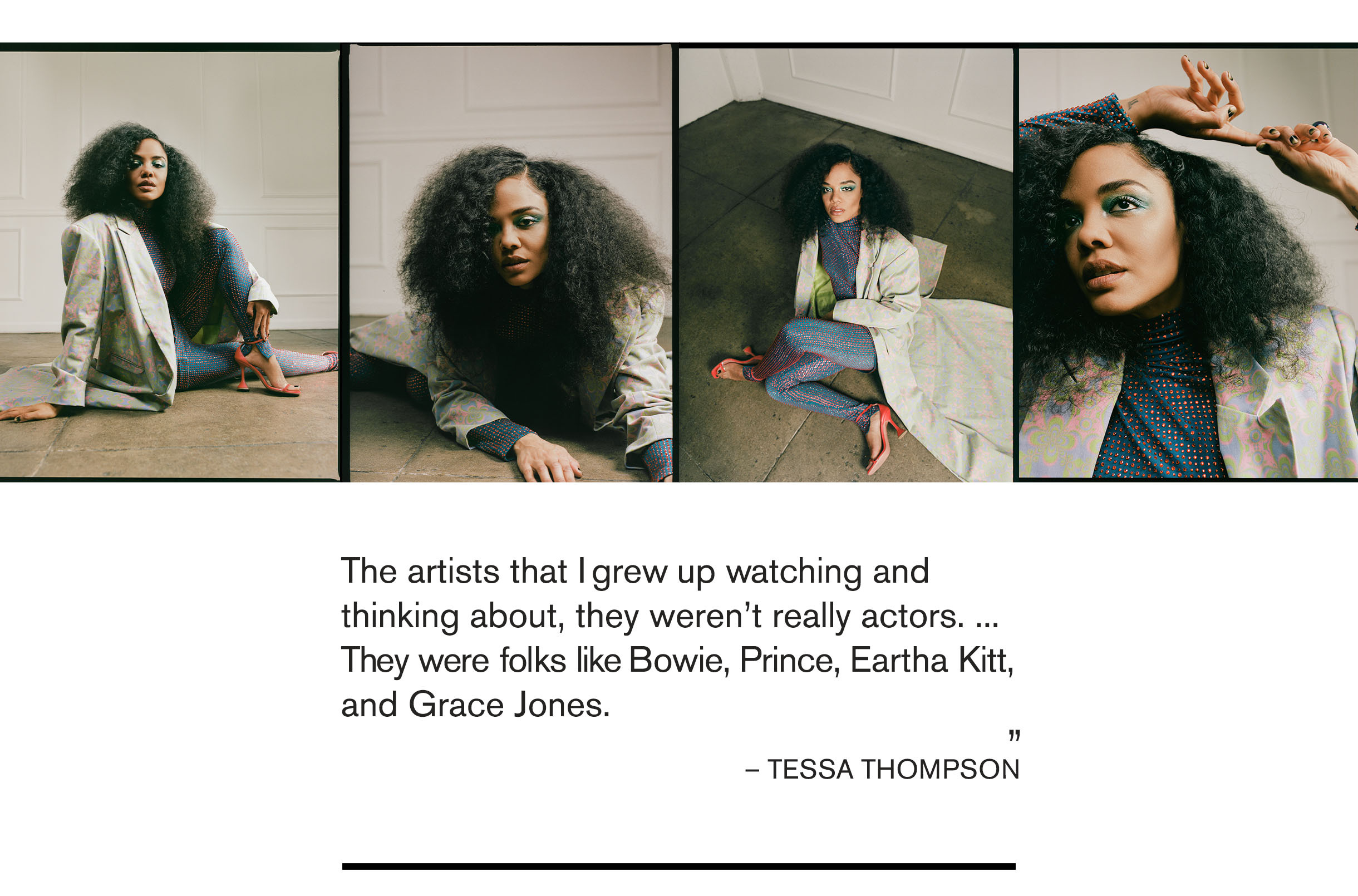
There’s a joy present on Thompson’s face when she talks about a past discussion with Dear White People director Justin Simien around why there should be more Black people in space. It’s clear that she isn’t just committed to Black folks in outer space, but in all spaces. Whether she’s shopping for her character Detroit or making sure that Valkyrie, a canonically bisexual character, is fully represented on-screen, it’s apparent when Thompson takes a role that she makes sure the audience know she sees us. She sees her characters for their complete and complex selves.
That diversity in thought, commitment to showing up fully, and desire for full representation are apparent in how Thompson shows up in the world off-screen, too, especially on red carpets. Thompson thinks of Black joy and passion being on display through the artistry created by her styling team, led by stylists Wayman Deon and Micah McDonald. "We’ve been on this journey together now for some years,” she says of her partnership with the duo. "There is a real intentionality to the choices that we make. Working with young, up-and-coming Black designers, designers of color like that [is] something that really means a lot to me.”
Thompson’s style can’t be defined by a single philosophy. Rather, it’s a vibe. "The artists that I grew up watching and thinking about, they weren't really actors. They were musicians. They were folks like Bowie, Prince, Eartha Kitt, and Grace Jones. And something that always struck me about those folks is this idea of clothing in a way as armor. And I think sometimes there’s this idea that [it’s] a way to hide,” she says. "But for me, I think it feels like it sets you free in a way. If you can illustrate to people that you are something that is ever evolving and growing and changing, then you give yourself limitless space in which to evolve, grow, and change slowly, particularly someone that’s public.”
Thompson sees herself as a reflection of her team, a walking billboard displaying the brilliance of their work. She embraces the idea of muse and art piece but can attest that she’s still in awe of their genius and style philosophy after all this time. Whether it’s the style Super Bowl (the Met Gala) or a stunning press tour for Passing, it’s all an extension of a broader narrative.
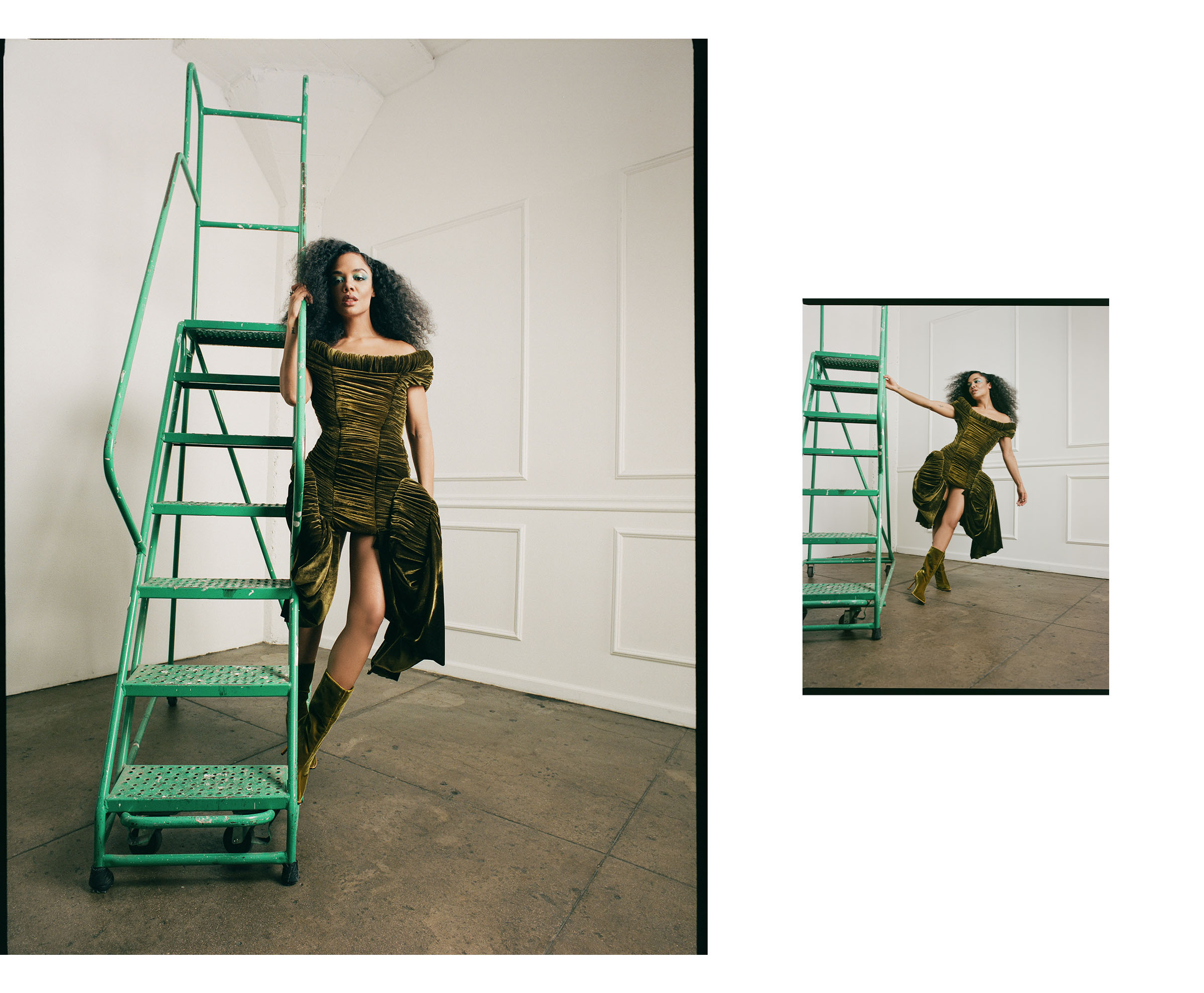
The beauty of Thompson’s sartorial voice is it’s not limited to a single house or style. It’s rooted in what she knows she’ll feel most confident about. "I remember someone saying to me, ‘Don’t dress to look the part. Dress to feel it.’ And then it meant that when they would say sexy I would walk in things that maybe outwardly were not the sexiest, but I felt sexy, and I felt good. I think that’s what’s fun as we [Thompson’s style team] expand each other. … Sometimes in fashion, there’s this idea that there’s so much excitement in wearing certain houses and brands, and of course, there should be, but just because the dress is by an esteemed and amazing fashion brand, it doesn’t mean it’s the dress for you or the one that speaks to you” she says.
Looking at her catalogue of characters, Thompson would exchange some wardrobe pieces with Sylvie’s Love’s Sylvie. And for anyone familiar with the stunning costumes of that film, you can see the period costume artistry present again in Passing. "There’s definitely a part of me that just loves those silhouettes and that ultra-feminine period way of dressing. I grew up as a little girl looking, watching my grandmothers, looking at old vintage photographs of them with hats and gloves. And I would be in their closets. And I think that was my idea as a child of how I would dress when I grew up,” Thompson says.
On the inverse, don’t expect to see Thompson in the metaverse styled like Charlotte from Westworld. "If I’m gonna be in 2050, I just want to be draped in Margiela. I just want to be in one big Tabi,” she says.
When I finished talking to Thompson, I felt energized and ready to lead with the same joy and passion she does, basking in the glow of the fairy dust she manages to pepper on the situation. As I reflect on what fuels that feeling, perhaps the experience of chatting with Tessa Thompson can be summed up to a thought by Toni Morrison. She tells Black stories, wears Black designers, works with a Black style team, and embraces her full intersectional identity because, as Morrison said, just the novelty of Blackness is a compelling story. All the rest about her is just magic sprinkled on top.
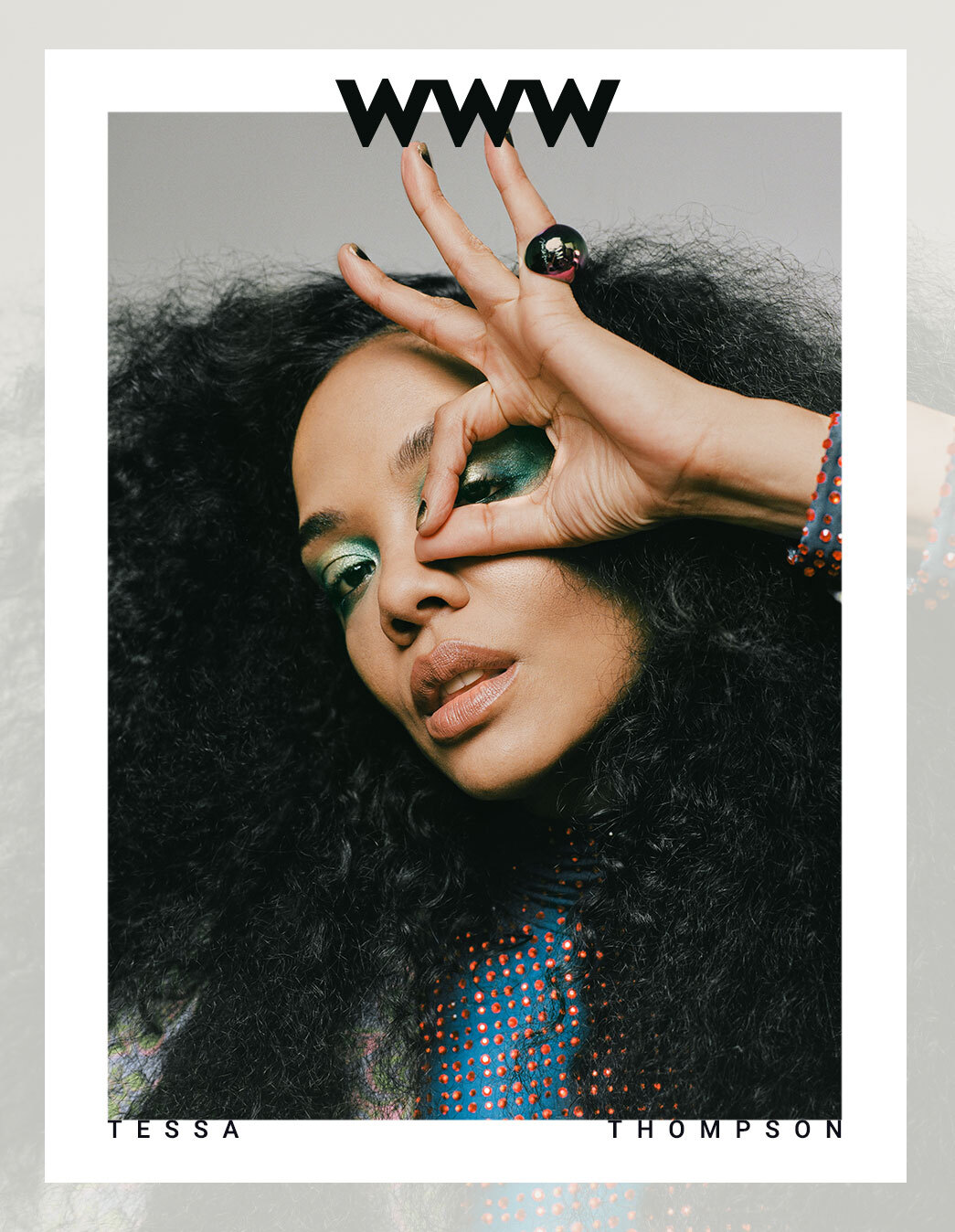
Photographer: Leeor Wild
Stylists: Wayman + Micah
Hairstylist: Marty Harper using NatureLab Tokyo at The Wall Group
Makeup Artist: Cedric Jolivet
Manicurist: Steph Stone
Creative Director: Cassandra Lear